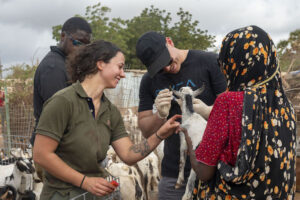
Story by Sgt. Jalen Miller
Combined Joint Task Force – Horn of Africa
A team of service members rush out of their vehicles carrying containers filled to the brim with needles, medications, gloves, and a variety of veterinarian essentials. They set up shop in the center of a village and open their collapsible steel fences for the incoming swarms of livestock.
A scene that came to be after two years of planning resulted in Combined Joint Task Force – Horn of Africa (CJTF-HOA) service members and Southern European Task Force – Africa (SETAF-AF) Civil Affairs personnel teamed up to help local villagers and veterinarian personnel provide medical treatment to livestock in the villages of Negad, Chabelly, and Ali Oune. The Herd Health Vaccination Engagement (HHVE) aims to provide Peste des Pestits Ruminants (PPR) vaccinations, deworming agents, vitamins, wound spraying, and general medical treatment for a variety of Djiboutian herd animals including camels, goats, sheep, and donkeys.
The PPR virus, also known as the goat plague, is a highly contagious viral disease found in goats and sheep throughout the Middle East, Asia, and large regions of Africa. The vaccine injected into the livestock works to prevent the spread of the PPR virus, which could potentially kill anywhere between 30-70% of affected herds on the continent.
U.S. Army Lt. Col. Erica Himes, SETAF-AF HHVE veterinarian officer-in-charge, led the small team of volunteer veterinarians from Jan. 29 – Jan 31st, 2024.
“With our vaccination engagement we’re getting close to seeing a thousand animals every day,” said Himes. “The World Health Organization and the Food and Agriculture Organization are wanting to eradicate the PPR disease by 2030, so this vaccine campaign is really important if we hope to help these animals,” said Himes.
Each day, military personnel corralled the farm animals within their enclosure and one after the other, each animal was vaccinated, given vitamins, and marked with a harmless paint marker to track the vaccinated animals. Once every animal in their collapsible enclosure is treated and marked they utilize their wound spray compound to treat any cuts or damages the animals may have had before clearing the enclosure and restarting the process with the next herd of livestock.
After each day and each village visit, the number of CJTF-HOA volunteers increased. Service members from a variety of sections volunteered to support the herd health mission and help the local community.
Dr. Elmi Ali Ahmed, a local Djiboutian veterinarian with the Ministry of Agriculture, worked alongside the service members and expressed his gratitude for the contributions of the U.S. military when it came to the vaccination effort. Through a translator, he described the importance of the role that vaccination and the medical care provided by the U.S. will play in helping livestock remain healthy during the cool season in Djibouti.
“Together we did something very important, the people here appreciate the help the U.S. military has provided us and the work we do will help keep our animals healthy and our community growing,” said Dr. Elmi
U.S. Army Capt. Jermel Richmond, the SETAF-AF Civil Affairs HHVE planning officer in charge, coordinated the event with the Ministry of Agriculture in Djibouti and worked with service members to ensure that their mission worked to both benefit the local population and promote collaboration between components and nations. Richmond expressed his gratitude for the expertise of both Himes and non-commissioned officer-in-charge U.S. Army Sgt. Russell Helma when it came to educating volunteers on proper veterinarian procedures. Richmond also expressed appreciation to the surplus of volunteers who signed on to help with the project.
“I cannot express how thankful I am for everyone who signed on to help out Civil Affairs with this project and help us help our local population,” said Richmond. “A win is a win, whether we inject one sheep or a thousand it’s all about doing what we can to help out our local populace and work together with our host nation,” said Richmond.